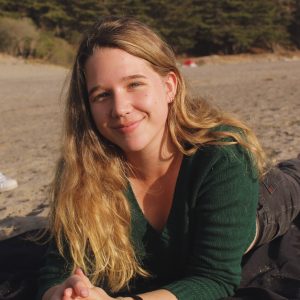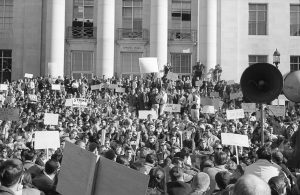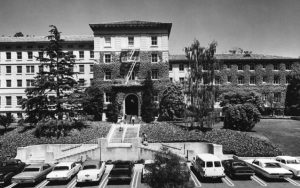Tag: Cowell Hospital
From the OHC Archives: Linda Perotti, Apolitical Advocate
By Annabelle Long

Annabelle Long is an Undergraduate Research Apprentice at the Oral History Center. She worked with Shanna Farrell during the Spring ’21 semester. Annabelle is a third-year History and Creative Writing student from Sacramento. She works as a conduct caseworker in the Student Advocate’s Office and enjoys going on long walks in Berkeley. You can find her on Twitter @annabelllekl.
Linda Perotti didn’t mean to join a movement. She arrived in Berkeley a year after the Free Speech Movement got its raucous start on the steps of Sproul Hall, the university’s now-famous administrative building on the southern edge of campus, and she was more concerned with keeping up with her coursework than with any of the growing number of antiwar and civil rights movements that would come to characterize Berkeley in the late 60s.
“[T]he thing I remember most is the Sproul steps, just sitting there and watching people go by,” she said of her freshman year. She regarded herself as an observer, never a participant. But as these things tend to happen, a movement found Linda anyway.
As a freshman at Cal, Linda was surrounded by the energy of the movements unfolding across campus. Sproul Plaza seemed perpetually occupied by someone giving an impassioned speech about any number of political issues to a crowd of eager students, her male friends constantly fretted about being drafted, and sometimes, police vans and teargas would descend on campus, their motivations largely unbeknownst to her. On any given day, her Sproul people-watching might have included a lecture on the value of political speech on college campuses, a demonstration against the Vietnam War, or a march down Telegraph Avenue, which led from campus into the city. UC Berkeley, to her, was a thrilling, semi-utopic reprieve from a culturally homogenous childhood spent in Michigan and the San Fernando Valley; a place where everyone and everything could be reached on foot; a place where she could be an individual; a place where everyone was intellectually serious, but no one took themselves too seriously.

Sproul Plaza during the Free Speech Movement
Linda remained uninvolved in campus politics for her first two years at Cal, but that doesn’t mean she wasn’t paying attention to things happening around her.
“I remember one of the eeriest sights, when I really became aware of what a political hotbed Berkeley was,” she said of witnessing a stand-off outside her freshman dorm, just south of campus, “What turned out to be a SWAT team. They were all cops, just gathering, with shields and helmets and batons. I had never seen anything like that. It was extremely scary. Now if you saw that, you might just shrug and say, ‘Oh, something’s going on.’ But in 1965, it was a real phenomenon.” She didn’t have to be involved in a movement to understand that they were everywhere in Berkeley.
She moved to a new apartment on Ward Street at the beginning of the summer of ‘68—the summer of Robert Kennedy’s assassination, the Poor People’s Campaign, and Nixon’s nomination—and soon found herself spending a lot of time with the Roberts family, whose comings and goings via van and motorcycle she’d observed for weeks before discovering that one of the motorcyclists was her acquaintance, Mark Roberts. The small, green Roberts house was a peculiar one for a college town, and Linda was drawn to the fact that the Roberts family actually acted as a family unit. Linda had many friends, but they were just as independent as she; she didn’t yet have a family in Berkeley.
Zona Roberts and her sons were different. Zona zipped off to class on her motorcycle each morning, and there seemed to be a constant rotation of young people cycling in and out of the house.
“The whole family—they’re a very friendly family. Very, very friendly people. And just very unassuming. At the time, Zona was a student at Berkeley herself. Her husband had died a few years earlier. I don’t know how she did it financially. She was always on the edge, but somehow she managed,” Linda recalled.
She was attracted to the hum of energy radiating from the house and soon befriended Mark’s older brother Ed Roberts, the first wheelchair user admitted to UC Berkeley and the eventual father of the Disability Rights and Independent Living Movement. He suggested that she stop by Cowell Hospital and lend a hand. Cowell, while a fully functioning campus infirmary, also functioned as a dormitory of sorts for physically disabled students. It was unlike any program that existed anywhere else, and while Linda’s recollection of her early days there was hazy, she spent her summer on the northwest side of campus, doing odd jobs at Cowell.

Cowell Hospital
As a woman, the help she could offer was limited—only men lived in Cowell at that point, and she recalled that “the men only had other young men working for them,” so she found herself doing laundry, typing up various documents, pushing wheelchair users around campus, and hauling enormous pots of chili and spaghetti across campus for Friday night dinners. Gender continued to define Linda’s relationship to Cowell and the budding Disability Rights Movement writ large; to her, the politics of the movement were for the boys.
“I never was interested in the political aspects of it,” she said, “It was just a byproduct as far as I was concerned. I even used to laugh at the guys. See, ‘the guys.’ It just happened to be that way.”
This disinterest was not from lack of care, but rather what Linda described as a naturally apolitical disposition. It wasn’t as if she wasn’t also interested in the pro-disability rights causes “the guys” were organizing for; of course she was. She spent her days working at Cowell and with the leaders of the Disability Rights Movement, albeit never in the context of their activism.
“This was really good for me,” she said of her proximity to their activism, “because it suited my level of political interest or awareness.” To Linda, her work was most significant when it was on the ground and person-to-person. Someone else could handle writing to the Chancellor.
“I had gone through the Cowell Hospital movement where people got organized and found their own strength and actually made their demands in such a way that the university responded to them and actually established a program just to serve the physically disabled,” she recalled, “That was very interesting.”
In the fall of 1968, the Cowell Program admitted its first female resident, and just as he had earlier in the summer, Ed Roberts encouraged Linda to go on up and introduce herself. Perhaps, Ed thought, Linda could serve as this new resident’s attendant, and help her with day-to-day tasks like bathing and getting dressed for class. Cathy Caulfield, Cowell’s first female resident, arrived in time for the fall semester, and sure enough, Linda became one of her attendants. At the same time, Linda recalled, the conversations that would serve as the foundation of the disability rights movement started picking up on the third floor of Cowell, where the program residents lived. Something was in the air.
But Linda was focused on her work. She had never been an attendant before, and the job was demanding. She deeply cared about being a good attendant for Cathy, and even beyond that, she cared about being a friend to her. So Cathy taught her how to change a urinary catheter, and how to dress and bathe her, and in turn, Linda learned how to be caring and gentle and composed. Her experience was typical; none of the attendants had formal training beyond what the people they worked for taught them. Cathy soon became deeply involved in the political organizing happening on the third floor, and she and Linda became good friends.

“I didn’t see myself as part of an attendant group because the rest were guys, and they worked for the guys, and my two friends and I worked for Cathy, ‘the woman,’” Linda said, referring to her two close friends who also worked as attendants. Her focus was Cathy, not finding community with other attendants or Cowell residents, and to her, that was just as well.
The next few years of Linda’s life track nicely alongside the development of the Disabled Students’ Program (DSP) and the Center for Independent Living (CIL)—she stopped taking classes during what would have been her senior year, and spent a lot of time with the organizers behind DSP and CIL as the programs swelled in size and scope. Still, though, movement politics were uninteresting to her. She cared about streamlining attendant referral services—everything was still word of mouth—and developing peer counseling services for disabled students, and helping the organizers accomplish other goals that they had, but she understood her role to be primarily administrative.
Linda Perotti never thought of herself as an activist. Her work was work, even if that work was also groundbreaking and life-changing and empowering for more people than she ever probably knew she could reach. The Sproul steps that she remembered so fondly have since witnessed many more movements, and many more generations of students who have benefitted from the activism—and semi-passive support—of Berkeley students that came before them. Linda may not have meant to join a movement, and maybe she would contend that she never actually did, but she certainly made a difference—for Cathy and the other Cowell residents, for herself, and for the generations of Berkeley students that followed her.